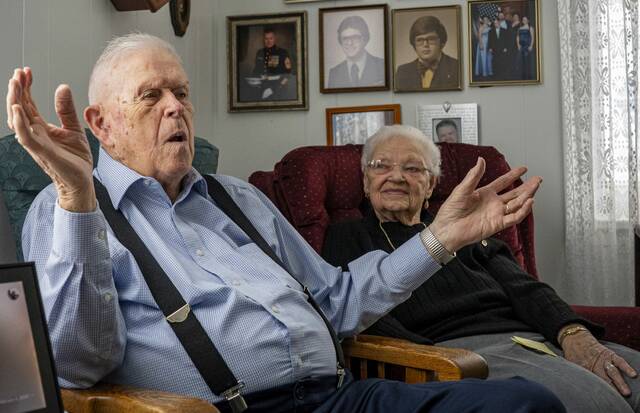What one family decides is a book worth studying may be a material that another family finds offensive.
The balancing act school districts play in the process was spotlighted this week when Hempfield Area School Board members heard from district librarians regarding text selection, as officials consider tweaking a policy related to reevaluating what books should be available for students and which one should be restricted.
Librarians outlined the process of how texts are selected and informed parents of ways to view a list of books available in Hempfield school libraries.
The school board’s policy committee is considering possible changes to the policy that determines how school materials are reevaluated if they are questioned. There has been a debate in the district after high school students were allowed access to two books deemed inappropriate by a small group of parents.
“Librarians make book and material selections to match the reading interest of their community and support the curriculum topics and research,” said Beth McGuire, a middle school librarian and library department chair. “Librarians utilize book reviews from peer-reviewed journals, state reading lists and national literary awards.”
From there, book orders are given to the department chairperson and the appropriate assistant superintendent.
Electronic books are part of the Connected Library Consortium, a statewide shared digital collection of eBooks and audio books. Each library in Hempfield has its own collection based on whether it is an elementary, middle or high school. Titles in that category are selected by a committee of school librarians, which does not include district librarians.
Full library catalogues by school, including eBooks, can be viewed at hadspa.net. Under the Student Services, click on Library Services.
Members of the policy committee are expected to revisit the topic during a meeting this month or in early May.
“I think there’s still a lot of work to be done on this,” said board President Tony Bompiani. “I don’t want to just throw it away.”
Over the past several months, several parents have questioned “All Boys Aren’t Blue” by George M. Johnson, which chronicles Johnson’s journey growing up as a queer Black boy. That text is available virtually in the district.
Parents also questioned “The Black Friend: On Being a Better White Person” by Frederick Joseph, which reflects the author’s experiences on racism.
A formal complaint was filed against the books, both of which went through the review process laid out in the policy.
As the policy stands, a district resident can formally request the reevaluation of instructional or resource materials in school libraries or classrooms. During informal challenges, the building principal will attempt to resolve the issues by explaining the procedure, criteria and qualifications for selecting the resource.
If the issue is not resolved, the resident can file a formal challenge, which is reviewed by the superintendent.
A committee — made up of the school librarian, the library department chair, a teacher based on the content area of the book, a parent, a student, the complainant, the assistant superintendent and the superintendent —will then read the entirety of the book being challenged. After that, the committee meets and reviews the book using a series of questions laid out in the policy.
Policy committee members last month made several suggestions on how to tweak the policy to make for a fairer process. Suggestions ranged from adding more members to the committee that reviews challenged books to separating books deemed offensive and requiring parent permission for a student to check out a book from that section.
That option was quickly opposed by librarians, who would be responsible for reviewing each text and monitoring which students were permitted into the section.
“Whether or not the book is offensive is a subjective decision,” said high school librarian Nicole Owens. “What one person considers inappropriate may be a beloved classic to another. A topic that one person finds controversial may be an issue that one of our students deals with on a daily basis. Having a separate section, reminiscent of the back room of video rental stores of our past, has a dual effect. It both draws attention to those books, but it also places shame on students who wish to read those books.”
She added that the best resource for finding out what is in the library is a parent’s child.
“You have the ability to view the catalogue,” Owens said. “Discuss with your children what is deemed appropriate or inappropriate for your own family. Ask your children what they are reading and you might end up having a very good discussion with them.”
In a letter sent to parents Tuesday, Superintendent Tammy Wolicki stressed that board members are not banning books.
“Rather, the process of policy development is being used to consider potential ‘common ground,’” she said. “Any modifications will require consideration of remaining true to the following statement within the current policy: ‘No parent/guardian has the right to determine instruction reading, viewing or listening material for students other than his/her own children.’”
Parent input
Over the past several meetings, a few parents have continued to push for a policy change.
“I do need to get something clear regarding the challenged books,” Paula Cinti said during last month’s board meeting. “This is not about censorship, and it’s not about banning books. Our media and those who oppose a policy change have turned this into something that it is not.”
Cinti then presented the board with a batch of what she called award-winning brownies, stating they are made with the finest chocolate and sugar.
“The only thing that I should tell you is that I did use just a small amount of manure in these brownies. … So who wants a brownie?,” she asked. “Sexually explicit content in challenged books is like the manure in these brownies. It should turn you off from making these selections available to our young students, even if said books have won an award.
“This is not about censorship or banning books. This is all about the responsible age-appropriate resource selection for the well-being of our student body.”
This week, Gregory Meyer was the lone person to speak for changes to the policy.
According to Meyer, students should be presented with materials that show how different situations are handled, or how to respond to different emotions.
But, he said, it’s all about context.
“Is it something that’s going to guide them, educate them to be thinking — think through their emotions, think what’s going on — or is it … leading to something that perhaps doesn’t lead them to be asking constructive questions,” Meyer asked. “It doesn’t have to be questions that I want, but constructive (questions) that leads them to good materials.”
Despite pushback from some parents, a large group attended in support of keeping the policy as it stands.
“I want to express my support for the current book review policy,” said Ceil Kessler. “This system is thoughtful, it’s deliberate, it’s objective and it takes into account the views of parents but also the insights of professionals who spent years honing their career and their understanding of children and literature. I believe that thoughtful consideration, informed by expertise are the hallmarks of good policy.”
Patrice DiPietro added that she trusts in the educational background and the professional experience of the district librarians.
“They were hired by the school board and I believe they should also be trusted by the board regarding this matter,” she said.
Stacey Ross stressed that no parent or guardian should have the right to determine what another student reads, listens to or views.
Kristen West agreed, adding that the policy as it stands is an important part of the educational process.
“It is my opinion that current policy ensures intellectual freedom, which is the right of every individual to both seek and receive information from all points of view without restriction and the ability to explore all side of an issue, question or a cause,” West said. “The policy as it stands ensures students continue to have access that that diversity of thought.”








